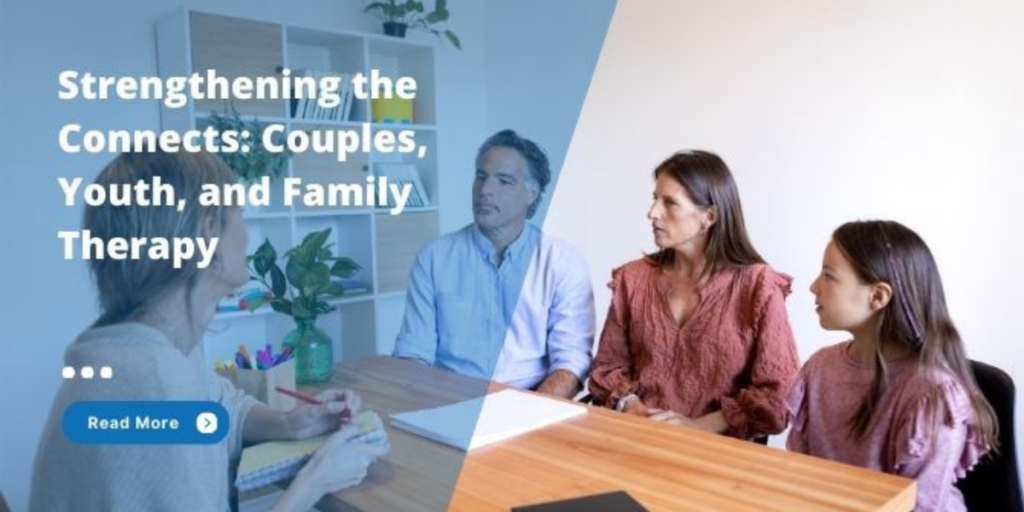How Telehealth is Revolutionizing Autism Care in New Jersey Telehealth medicine is quickly becoming one of the best options Modern...
Continue Reading
With the busy lives that people live, relationships tend to be quite a challenge. There are communication gaps, there are differences, and, in most cases, there are emotional issues which couples, families, and youth encounter. There are such issues which an individual can resolve on his own, but doing so cannot be recommended as relationships require some counseling. It does not matter whether it is about communication, arguments, or even emotional upheaval; couples, youth, and family counseling provides effective tools to minimize the challenges and build connections.
Communication is a crucial element for success in every relationship. However, it is often the first area people struggle with during conflict. Poor communication can lead to misunderstandings, emotional detachment, and anger. If you have questions about couples therapy, rest assured that communication techniques can be learned and practiced. This allows quarrelling spouses or families who have faced betrayals to rebuild trust and improve their ability to communicate effectively with one another.
Active listening: Motivates partners and family members to listen and be able to understand each other’s points of views.
Using “I” statements: Helps in apportioning blame and aims to have a more feeling oriented exchange.
Reflective feedback: Lets the message being communicated be fully processed and comprehended.
One of the major purposes of counseling is to assist individuals and families learn the importance of open, honest and empathetic communication. In enhancing the skills of the clients, the counselors assist them in addressing and practicing their communication skills by doing various techniques on how best they can communicate their ideas and feelings effectively.

Handles disagreements: Develops the skills of acceptance and tolerance and peace during disagreement.
Conflict is a common phenomenon in the field of relationships as people develop differences in ideas, perceptions and even sometimes in characteristics. It is only when mismanaged and unaddressed, that conflict causes withdrawal and even grudge/cold feelings. Counseling highlights how to disagree without being disagreeable. Focus is on the need to identify the source of the conflict without exacerbating the issue by venting out.
Conflict resolution strategies include:
Repositioning – a strategy that helps in resolving conflict by allowing individuals to be able to look for and proffer solutions to a problem instead of going out of their way to castigate anyone.
Difficult situations resolution: management and coping strategies such as breathing and taking concern focus away to other areas so that the challenge does grow when people are angry.
Conflict win-win: Collaboration in conflict resolution so that subordinates from both sides do not feel excluded from the proceedings.
One fundamental strategy used in counseling is the repositioning of conflict which involves finger-pointing, or placing blame entirely on individuals rather than the situation. Such technique would aid individuals in being more willing and able to break negative patterns of interaction. Therefore, when reframing conflicts, couples and families can restrategize their thoughts and focus on the solution rather than the problem, which will help improve their relationship.

Today, let’s consider counseling first not in a negative way where something has gone wrong, but rather in a way that involves two partners coming together with mutual trust and emotional intimacy as a form of engagement. Counselors assist families in promoting their consistent core focuses by identifying and aligning their core values and collective objectives so nobody is lost in what the relationship encompasses working towards. Once the couples have established emotional comfort and understanding within the right places, couples counseling becomes possible with the use of these core etiquettes in mind.
Quality time: Spending meaningful moments to engage in activities that promote an emotional bond.
Appreciating differences: Different perspectives or people’s differences and learning to respect each other appropriately.
Strengthening intimacy: Cultivating the level of intimacy which involves emotional vulnerability and lying before one another.
Furthermore, this is also the instance where partners and additional family members have gone through the counseling phase, or approaches where they can then learn to accept the differences amongst them. Learning and accepting these differences in the beginning creates tension in the relationship and creates respect instead. Learning to appreciate each person’s uniqueness in turn deepens the overall bond resonance that families and couples can have.
Family Counseling New Jersey may also serve the role of empowering family members to voice their needs, wants, and fears in a safe space where they feel secure from any judgmental expressions or behaviors. This in turn nurtures emotional warmth and strengthens the family as a whole. Couples counseling however enables partners to bond by allowing them to spend quality time and participate in shared activities that provide emotional support to one another.

Perhaps the most apparent advantage of going for counseling is that it is the constant help one gets, counseling is usually sought in times of an emergency but it should be noticed that there are times when families or people in units in relationships would require the help of family counseling to maintain their cohesiveness and for growth.
Regular check-ins: Making sure there is progress and that goals are changed if they have been reached.
Pro active mindset: Helping a person focus on the fact that there are things in life that are emerging that can be held even before they fling off.
Emotional regulation: A simple application of stress and emotions.
People attending counseling have regular and ongoing safe spaces where they are able to talk about the new problems they are facing and work on further change for the better. For couples, it involves cursing in a number of times in a week to have discussions about their worries and how one feels important in a relationship. For families, continuing helping solves continued changes such as, children growing, changes in where they reside and occupation changes.
Aside from that, couples and families in counseling are becoming more resilient, precluding future problems by seeking resolution in earlier days. There are changes in what people view and how they communicate devoid of conflicts, what they see as stressing has no effect on them.
Adolescence is a sensitive stage of development psychologically and emotionally. Sick invitation. They are driven by certain expectations be it the academic, social, or family pressure. Counseling on teens gives an opportunity and a safe place where the adolescents can investigate the underlying emotions they have, develop their self-concept, and seek solutions for behavioral and emotional problems that they may come across.
Improve Self Esteem Level: Constructive self-image is promoted to adolescents.
Managing peer pressure: Assists teens in meeting social obligations while remaining authentic.
Managing anxiety and depression: Offering resources on how to handle mental health issues.
Teens often benefit from counseling where issues such as anxiety, depression, and peer pressure are discussed within a safe and private context . Counselors prepare the young persons on how they can cope with life events, handle relationships and communicate their requirements. The idea is to inform adolescents about how they should take care of their emotions and help them build skills that will assist them in the present and future.
Through a teen-centered approach, a counselor can resolve the parenting issues that stems from incongruence in parenting techniques, lack of communication or emotional availability through a counselor. With the help of a counselor, parents can adjust their response to their adolescent and lessen the escalation of issues in the house for a better family cohesiveness.
For the well-being of the family unit as a system, many counselors, especially those working with the family system, patients ` focuses its member`s health. Therapy aims to rectify and assists to improve relations within that unit rather than treating the family members as distinct individuals living in a vacuum. Instead of an apology or a solution of an iron and smelting and work in towards specific issues, engaging the family unit and focusing on the resolution in terms of the family systems theory, addressing enduring issues that have been entrenched in the family tree. Can Couples Therapy Help? Yes, it can. It does this by disrupting the patterns of dysfunction that have perhaps spanned centuries in the making in most cases. The therapy works toward identifying these patterns and giving suggestions to enhance communication and understanding in the end healing the family from the core.
Cycles can be negative and they can be broken. Dysfunctional families can be assisted to identify what provokes them so that they can break the cycle and abuse this wrong way of coping. It is worth applying a family-centered approach, which underlines the need to repair the bonds of every unit of the family, whether they are parents and their children, or children and grandparents.
Therapists help families by leading them through various exercises and discussions that nurture and encourage understanding, empathy, and cooperation. It shifts perspectives of how families carry out their lives; because it prevents addiction, separation, trauma or accountability for a singular mental health problem. It focuses on the wellbeing of the whole family unit, and allows the family to heal and grow from the issue.
Counseling is not restricted to cookie-cutter methods. Whether it is a case of a couple who cannot seem to communicate properly or families that are coping with drug or alcohol, mental or personal behavioral issues, therapy is able to meet a wide number of concerns.
Mental disorders: which include anxiety, depression and stress-related trauma.
Behavioral disorders: dealing with such areas as temper tantrums, disobedient attitude or even substance addiction.
Adjustment to different stages: Helping someone that has gone through a marriage breakdown, relocation or even loss of somebody close.
Counseling has the overarching objective of addressing the needs of both the children and the families as well. A variety of therapeutic modalities including, cognitive-behavioral therapy, emotionally focused therapy and family systems therapy are employed by Counselors in order to understand the problems and devise strategies for the clients. This enables the families and the couple in therapy to become clear, equipped and enlightened towards the goal of emotional healing.
Parenting is one of the most fulfilling and difficult tasks you can undertake. There are counseling approaches that seek to arm teachers with skills necessary to ensure that their children develop positively both emotionally and behavior wise. In this perspective, parents who are informed about child development concepts, discipline methods and communication approaches will promote healthy family relationships and assist their children’ growth.
Child development involves emotional and behavioral changes. They Develop at Slightly Different Rates Which Should be Considered.
Discipline strategies: Fostering positive behaviors in a child through tension and unfocused aggression.
Creating a supportive environment: Providing the family with emotional support and good communication.
Parent education in counseling also targets the emotional and the attachments challenges parents go through. Counselors teach parents how to relieve their internal Strains, establish effective boundaries, and appropriate relationship expectations to be portrayed. When parents are empowered, they shoulder the responsibility of nurturing the extended to family members as well.
In summary, working with couples adolescents or families is particularly critical in family life as there are many challenges that arise in day to day living. Who want to improve the quality of their interactions, who have disagreements and wish to resolve them, who want to grow their relationships, or have such connections establishe9d already including support, practically counseling always helps. By adopting a family approach and concentrating on the inner state of each family member, the family can develop together.
And if you are one of the people in need of these kinds of therapeutic help, don’t hesitate to contact any of these professional therapists. Couples Counseling New Jersey is equipped with the services that you are looking to get to enhance your relationship bonds with others.
How Telehealth is Revolutionizing Autism Care in New Jersey Telehealth medicine is quickly becoming one of the best options Modern...
Continue ReadingUnderstanding and Managing Emotions with Message-Centered Therapy Emotions are the brain’s way of analyzing our social environment, and they have...
Continue Reading5 Benefits of Online Depression Therapy While both in-person and online counseling can be very effective for relationship counseling, depression,...
Continue ReadingRequest an Appointment
(201) 497-0289


Copyright © 2024 | All Rights Reserved | Created By Invisio Solutions Ltd